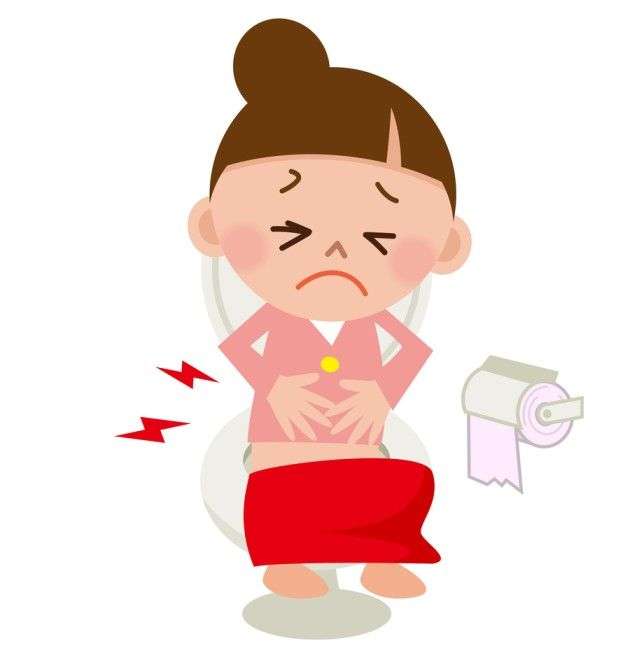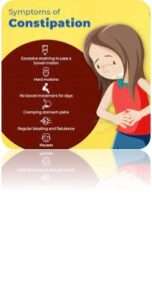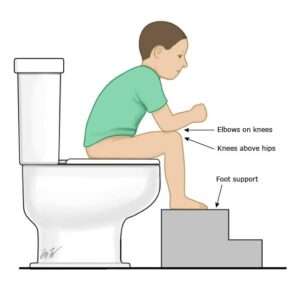CONSTIPATION IN CHILDREN
- Dr Maryum Sohail
- August 11, 2024
- 11:06 am

Constipation in children

may be defined as delay and difficulty in passing stool that persists for longer than three weeks. Although it is a temporary condition but one of the ten most frequent conditions that a child specialist usually deals with. The number of bowel movements per child varies but generally having less than 3 bowel movements in a week is considered constipation. This is frightening to both the child and the parents because the pain might inhibit children from using toilets. Pediatric office visits are close to 5% due to constipation. To reduce this number of visits and concerning situation let’s have a look into the article to solve this issue.
CONSTIPATION IN CHILDREN: –
It is a condition in children in which bowel movements become infrequent resulting in bulky stools and difficulty and pain during passing them out. It is a condition in which bowel movements become slow which make stools to become hard and dry. Children find it difficult to eliminate the stool and try to avoid using bathrooms.
CAUSES OF CONSTIPATION: –
Digestion Is the process in which colon absorbs water and forms stool that is dry and tough also pushes this stool towards the end of large intestine referred to as rectum and eliminate it out of the body. But in constipation the muscles of the colon are too slow which make the stool move slowly through the colon and retains a lot of water and stool gets extremely hard and dry.
If untreated the condition can get worse, and colon will not be able to sense that the stool is there.
There are so many reasons that can contribute to the constipation. Some common lifestyle and diet causes includes,
| Lack of physical activity | · Exercise help food move through the intestines. So children who are too lazy to do physical activities, watch more tv and play video games are more vulnerable to this condition. |
| Diet | · Eating food high in fat and low in fiber like junk food, fast food, soft drinks.
· Not drinking enough water
|
| Emotional problems | · Kids may withhold their bowel movements and are getting train to use the bathroom by parents for fear of using toilets.
· Feeling stressed because of family, friends, or school. |
| Busy children | · Any changes in kid’s routine like admission to a new school and not wanting to go to the toilets when needed can cause constipation.
· Children who don’t pay any attention to the signals of passing stools when needed suffer from constipation. This happens with children who are busy playing games. |
| Underlying medical problems | · It is a rare case scenario but having severe health issues can lead to constipation in children like,
· Intestinal tract problems of anus or rectum. · Nervous system disorders. · Endocrine problems like hypothyroidism. |
| Use of certain medications | · Anti-depressants, narcotics, antacids containing calcium and magnesium, anticonvulsants, Iron supplements etc. |
SYMPTOMS: 

Symptoms of constipation includes,
- Having fewer than three bowel movements in a week.
- Having swollen abdomen and bloating.
- Presence of mucus like liquid in child’s underwear.
- Passing stools that are hard, dry and lumpy.
- Children having stomach pain.
- Painful and difficult in passing stools.
- Letting you know that they think not all of the stool has passed.
- Changing positions to keep away from or delay having a solid discharge.
- Including rocking back on their heels after standing on tiptoes.
- Squeezing their buttocks.
- Performing bizarre, dance-like actions.
WHEN TO SEE A DOCTOR?
If the constipation lasts for more than two weeks even after doing home remedies to treat it than you should seek a medical help for your children.
Mentioned below are the risk factors that require immediate attention of healthcare providers,
- Bleeding from his or her rectum.
- Blood in his or her stool.
- Constant pain in his or her abdomen.
- Weight loss.
CONSTIPATION INCHILDREN -MANAGEMENT: –
Constipation in children can be managed by doing certain modifications in diet and lifestyle, such as
DIETARY CHANGES: –
Constipation can be treated by doing following changes in diet,
- Ensure that your child eat more fiber.
- Before buying the food packages parents must check the nutrition labels on them.
- By adding more vegetables and fruits to their diet chart.
- By adding more whole grain cereals, and bread.
| FOODS | MODERATE FIBER | HIGH FIBER |
| Cereal | Shredded meat, oatmeal, granola, oat bran, bran cereal | 100% bran cereal. |
| Bread | Bread made from whole grains, white bread. | |
| Fruits | Oranges, bananas, apple, blackberry, peers, avocado, raspberry, grapefruit. | Cooked prunes, dried figs. |
| Vegetables | Beets, broccoli, Brussels sprouts, cabbage, carrots, corn, green beans, green peas, acorn and butternut squash, spinach, potato with skin, avocado. | |
| Meat substitutes | Walnuts, almonds, peanuts, dates. | Baked beans, kidney beans, chili with beans, boiled lentils, boiled black beans, Chia seeds. |
Other dietary changes: –
Plan a diet chart for your child. It is best to serve them breakfast early and give them food in chunks by the interval of 30-60 minutes. This will also improve their bowel movement and reduce constipation.
Other changes in the diet of your child includes,

- Ensure that your child drinks a lot of water.
- Restricting drinks like caffeine, tea and soda in their daily routine.
- Restricting them from eating junk food that has high fat and low fiber content.
EXERCISE MORE: –
Encourage your child to play more as it is a sort of exercise that helps in reducing constipation. Digestion is assisted by exercise because it helps the normal movements of intestines that aid in pushing food forward as it is digested. People who don’t move around much and sit idol are often constipated. So let your child go play outside instead of staying indoors and watching TV and playing video games.
GOOD BOWEL HABITS: –
Train your child to use the bathroom regularly. Ask your child to sit on the toilet for at least ten minutes and two times a day. Try doing this right after eating. Don’t scold them if they don’t urinate or pass stool instead make them relax and talk to them nicely.
PREVENTION: –
It can be prevented by taking following points under consideration,
- Enough time to use the bathroom.
- Regular exercise.
- Eat healthy food.
- Proper toilet training for your kids.
- The right amount of fiber and fluids in your kid’s diet.
Dr Maryum Sohail
Subscribe to Dr Owais YouTube channel
For parenting advice, child health, symptoms, causes and treatment of illness in children.





